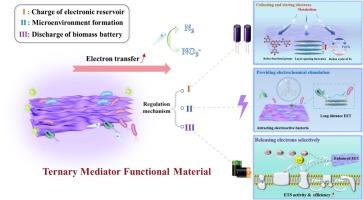伪电容性MXene@Fe-TA三元介质通过优化的电子转移和废水处理中的微生物调节来增强反硝化。
IF 9
1区 环境科学与生态学
Q1 AGRICULTURAL ENGINEERING
引用次数: 0
摘要
低效率的电子转移是实际脱氮应用中的主要挑战之一。为了解决这一问题,成功合成了一种新型三元介质功能材料(Mxene@Fe-TA),该材料具有赝电容特性,有利于电子的中介和分布。批量实验表明,50 mg/L MXene@Fe-TA对硝酸盐的降解效果为2.04倍。这种优异的性能源于三个综合机制:(1)MXene@Fe-TA作为假电容器,通过电化学结构存储底物代谢产生的电子;(2)培养选择性富集电活性菌(EAB)的微环境,促进氧化还原活性物质的分泌,加速细胞外电子转移(EET);(3) MXene@Fe-TA的电池功能促进了储存的电子定向流向反硝化,从而优化了能量利用,降低了代谢需求。本研究提出了一种创新的反硝化策略,并指导了多功能材料的设计,以提高生物废水处理的效率。本文章由计算机程序翻译,如有差异,请以英文原文为准。

Pseudocapacitive MXene@Fe-TA ternary mediator enhances denitrification via optimized electron transfer and microbial regulation in wastewater treatment
Inefficient electron transfer is one of the main challenges in practical denitrification applications. To address this issue, a novel ternary mediator functional material (Mxene@Fe-TA) was successfully synthesized, which exhibited pseudocapacitive properties to facilitate electron mediation and distribution. Batch experiments revealed that 50 mg/L MXene@Fe-TA achieved 2.04-fold nitrate degradation. This superior performance originated from three integrated mechanisms: (1) MXene@Fe-TA served as a pseudocapacitor, which stored electrons from substrate metabolism by electrochemical structure; (2) it fostered a microenvironment that selectively enriched electroactive bacteria (EAB), which boosted secretion of redox-active substances to accelerate extracellular electron transfer (EET); and (3) the battery function of MXene@Fe-TA facilitated the stored electrons flowed directionally to denitrification, thereby optimizing energy utilization and reducing metabolic demands. This study introduced an innovative strategy for denitrification and guided the design of multifunctional materials to improve the efficiency of biological wastewater treatment.
求助全文
通过发布文献求助,成功后即可免费获取论文全文。
去求助
来源期刊

Bioresource Technology
工程技术-能源与燃料
CiteScore
20.80
自引率
19.30%
发文量
2013
审稿时长
12 days
期刊介绍:
Bioresource Technology publishes original articles, review articles, case studies, and short communications covering the fundamentals, applications, and management of bioresource technology. The journal seeks to advance and disseminate knowledge across various areas related to biomass, biological waste treatment, bioenergy, biotransformations, bioresource systems analysis, and associated conversion or production technologies.
Topics include:
• Biofuels: liquid and gaseous biofuels production, modeling and economics
• Bioprocesses and bioproducts: biocatalysis and fermentations
• Biomass and feedstocks utilization: bioconversion of agro-industrial residues
• Environmental protection: biological waste treatment
• Thermochemical conversion of biomass: combustion, pyrolysis, gasification, catalysis.
 求助内容:
求助内容: 应助结果提醒方式:
应助结果提醒方式:


